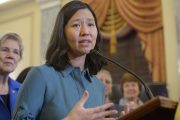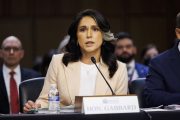
“A global power structure that is responsible for the economic decisions that have robbed our working class, stripped our country of its wealth and put that money into the pockets of a handful of large corporations and political entities,” was the wording of a Trump TV commercial late in the presidential campaign, complete with the face of the chief executive of Goldman Sachs, Lloyd Blankfein, on the screen.
Yet President-elect Donald Trump has named Blankfein’s friend and associate, the chief operating officer of Goldman Sachs, Gary Cohn (shown), to lead the National Economic Council (NEC), the third Goldman executive tapped for either a staff or Cabinet post. It is somewhat reminiscent of comments made by Jimmy Carter’s campaign manager, Hamilton Jordan, made after Carter had won his supposedly “anti-establishment” campaign for president in 1976. Jordan told reporters, ”If, after the inauguration, you find a Cy Vance as secretary of state and Zbigniew Brzezinski as head of national security, then I would say we failed. And I’d quit.”
After the inauguration, Vance was secretary of state, and Brzezinski was national security advisor, but Jordan did not quit.
During his successful run for president, Trump often railed against the influence of Wall Street investment firms generally, and Goldman Sachs in particular. He said his chief rival for the Republican nomination, Senator Ted Cruz of Texas, was “in bed” with Goldman, once tweeting of Cruz, “Goldman Sachs owns him, he will do anything they demand.”
After winning the Republican nomination, Trump turned his attention to Democrat nominee Hillary Clinton’s strong associations with Wall Street, especially Goldman Sachs, although Trump had already tied Clinton to Goldman even before he won the nomination. At one Republican primary debate, Trump said, “I know the guys at Goldman Sachs. They have total, total control (over Cruz), just like they have total control over Hillary Clinton.”
Cohn has been at Goldman for 25 years. The NEC, which Cohn will lead, was a post established by President Bill Clinton. Clinton’s choice to lead the NEC was Robert Rubin, then co-chairman of Goldman Sachs. The NEC is supposed to “coordinate policy-making for domestic and international issues, to coordinate economic policy advice for the president, to ensure that policy decisions and programs are consistent with the president’s economic goals, and to monitor implementation of the president’s economic policy agenda.”
Trump previously named Steven Mnuchin, a partner at Goldman as secretary of the treasury. Steve Bannon, who ran the very pro-Trump Internet news service Breitbart News, will be Trump’s senior advisor in the White House. Bannon previously worked at Goldman Sachs, in acquisitions and mergers.
Perhaps a key to understanding the appointment is that Cohn is a friend with Jared Kushner, Trump’s son-in-law, who is married to Trump’s daughter, Ivanka. CNN reported previously that Trump highly values Kushner’s advice, so much so that Kushner is expected to move to Washington, D.C., and take a key advisory role inside the White House.
It is believed that the principal reason Trump met with former Vice President Al Gore at Trump Tower was due to the urging of Ivanka. Ivanka shares Gore’s belief that human industrial activity is causing global warming. But soon after the meeting with Gore, Trump named Oklahoma’s attorney general, Scott Pruitt, to head up the Environmental Protection Agency (EPA). Pruitt is a close political ally of Oklahoma’s Senator Jim Inhofe, perhaps the Senate’s most vocal critic of what he calls the “hoax” of global climate change.
Cohn is a registered Democrat, who has donated to both Democrats and Republicans, including Hillary Clinton’s Senate campaigns. But he only gave to Republicans in the 2016 campaign year.
He grew up in the Cleveland suburbs, the son of a real estate developer and electrical contractor. After attending a private school, he went to American University. After graduation, Cohn worked for U.S. Steel in Ohio, then took a position with the New York Mercantile Exchange in 1983, eventually becoming a silver trader. In 1990, he went to work at Goldman Sachs, becoming a partner in 1994. By 2006, Cohn was co-president and co-chief operating officer of the investment firm. He was seen as the heir apparent as CEO of Goldman when his friend, Lloyd Blankfein, retired from that position..
Cohn’s views on some issues seem to be different than Trump’s. Cohn is much more of an internationalist than Trump, whose public statements have classified him as more of a nationalist, especially in economic policy. Speaking at a conference in Florida a few days after the election, Cohn said the country’s economic problems were tied to the world’s economic difficulties, saying the biggest problems facing the country was the “global growth issue.”
Cohn insisted that the United States’ economic woes cannot be solved just by domestic economic policies. “We’re trying to solve it with domestic policy. It’s not going to work.”
Trump was very vocal during the campaign in speaking against companies, such as Carrier, that move their operations (and jobs) out of the country. But Cohn has taken a contrary view. “We have a globalized work force, so when I need to go out and hire the incremental worker, I go out and look around the world and see where that incremental worker is available.”
In recent years, Cohn has jetted to various global economic summits, including the World Economic Forum in Davos, Switzerland.
Of course, Cohn agrees with Trump on the need to reduce regulations that were imposed on banks (such as Goldman Sachs) following the 2008 financial crisis.
Standard & Poor’s Global Market Intelligence reported that, as of November 14, Cohn owned 872,712 shares of Goldman Sachs, making his stock worth more than $200 million. Since the election, Trump’s promises to push for lighter financial regulations have caused the stock of financial institutions such as Goldman to increase dramatically. Goldman’s stock price is up 34 percent.
Cohn’s friend Blankfein, Goldman’s CEO, is a strong Democrat who publicly backed Clinton in the presidential race, but recently told the Wall Street Journal that Trump is “a very smart guy.” He added that Trump “may turn out to be a much better president than anyone else might have been in that place.”
Of course, whether Trump turns out to be a “much better president” than expected in the eyes of the CEO of Goldman Sachs, may or may not be something those who strongly supported Trump in his presidential bid will find comforting. But then again, Trump has been wildly unpredictable since the day he descended the elevator at Trump Tower last year to announce his unconventional bid for the White House.




